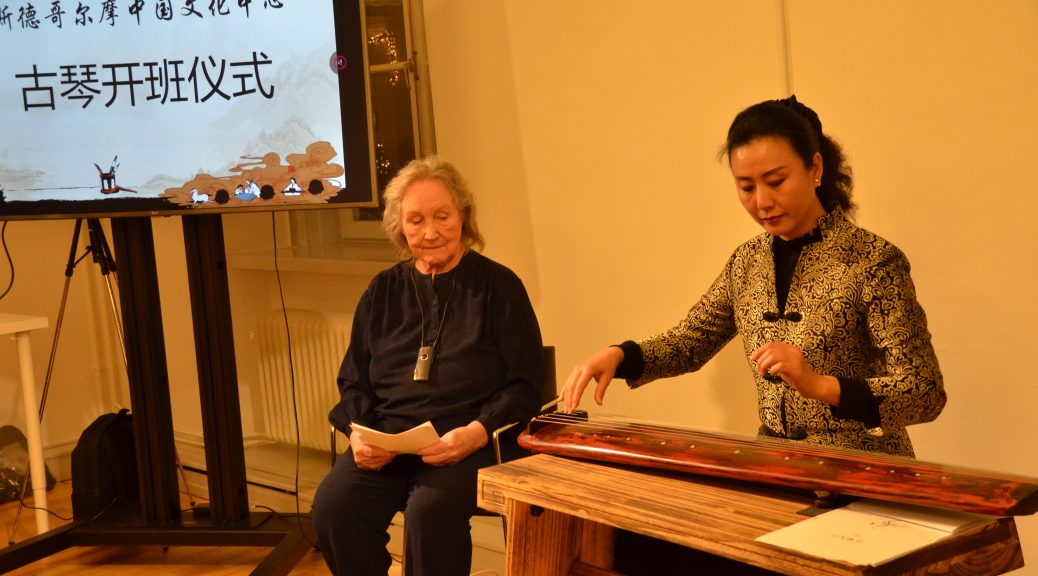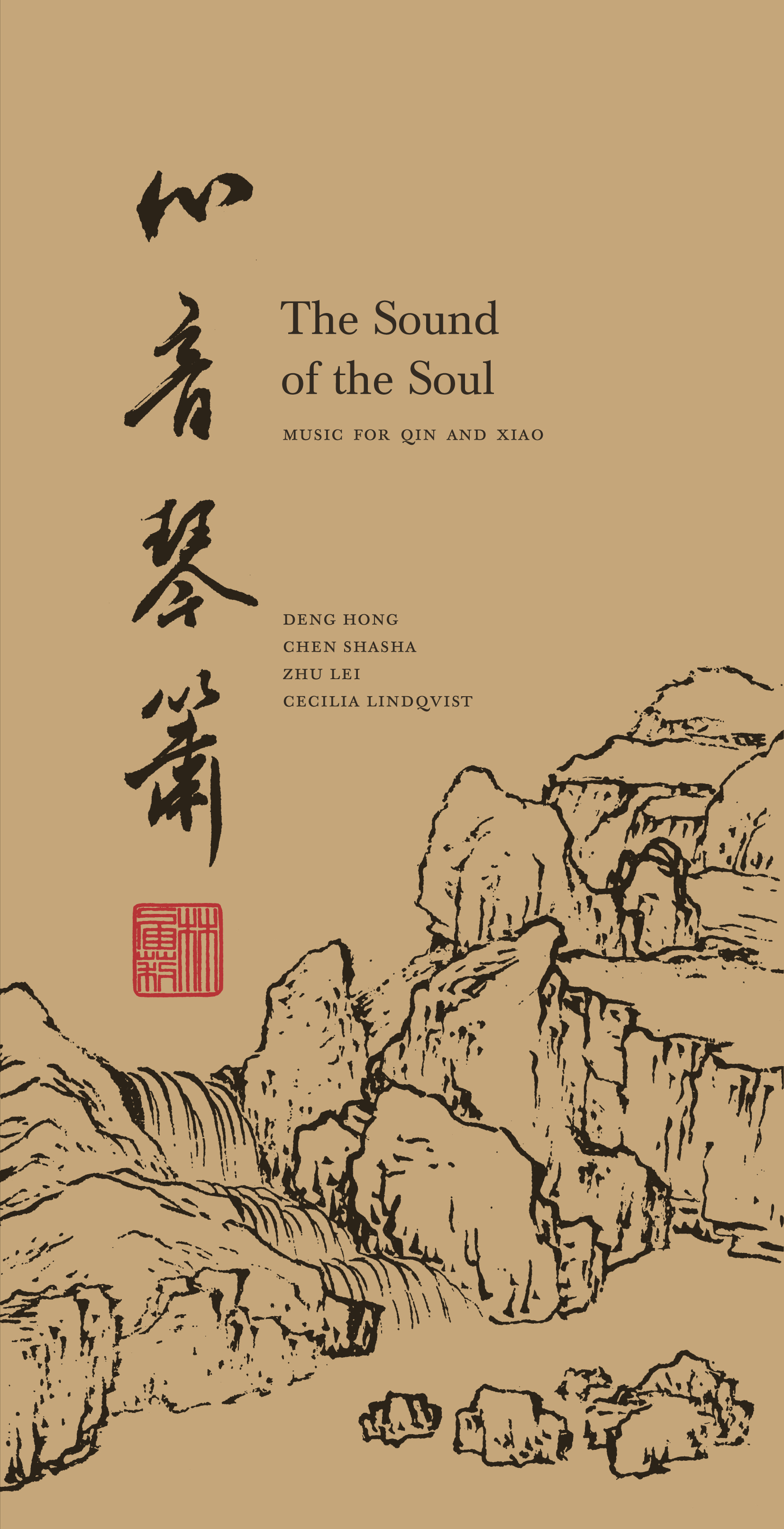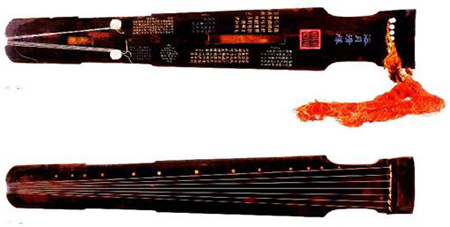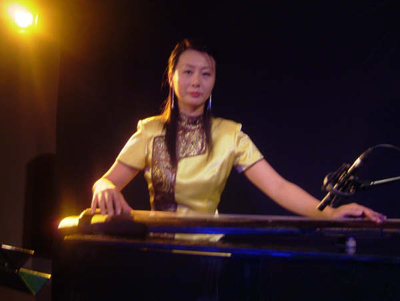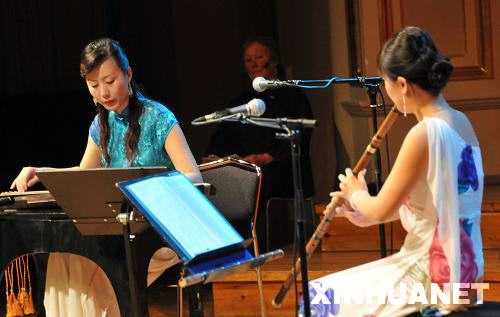北欧绿色邮报网北欧中华网联合报道(记者陈雪霏)– 全球中国文化中心首个古琴培训班在斯德哥尔摩中国文化中心隆重开班大受欢迎。
中国驻瑞典大使馆文化参赞、斯德哥尔摩中国文化中心主任浦正东在开班仪式上说,这是全球中国文化中心中第一次开办古琴培训班。主要目的是要传播中国古琴文化,让海外华人华侨,所有的古琴爱好者来学习体验古琴的魅力。为此也特意请来了瑞典著名汉学家古琴演奏家,作家林西莉女士和中国著名古琴演奏家邓红来出席开班仪式。
林西莉带着脚疾坚持出席开班仪式令人赞叹。她介绍说,古琴是中国3000多年前的文人墨客交友时演奏的一种乐器。她不是那种宏大的交响乐类型的,而是静思表达心声的一种乐器。
林西莉说,她是1961年到中国北京大学去学习汉语和艺术史的。但是,后来,她获得机会到古琴研究院学习。在那里,有好几个老师只教她中外一个学生。而最直接教她的老师是王迪,就是邓红的母亲。
林西莉学习两年后回国,但是对中国古琴念念不忘,所以就写了一本《琴》的书。在写作过程中,她几乎年年到中国去,向王迪老师讨教,先后也花了她10多年的时间。她的这本书出版的时候,王迪老师不幸去世。
林西莉铭记恩师的教诲,决心传播古琴文化。她的书出版后,荣获瑞典最高文学奖奥古斯特奖。实际上,这是林西莉第二次获得奥古斯特奖。第一次是因为她的《汉字王国》而获奖。
就这样,林西莉把古琴演奏家邓红和箫演奏家陈莎莎请到瑞典进行了多场演出,每次都是二百多人爆满。因为古琴是一种非常高雅的乐器,一般200人足以。在这种环境中细细品味古琴的韵律是一种无尽的享受。规模再小一些,也是可以的。
古琴最大的魅力是人们耳熟能详的中国名曲,例如《平沙落雁》和《流水》。林西莉说,古琴音乐不仅仅是音乐,它也是诗,也是散文。
邓红就在现场为大家演奏了《平沙落雁》。她把每一个音符都演奏的如此饱满,如此玄妙,让人感受与其他任何乐器都不一样的感觉。透过这不紧不慢,十分端庄的一举一动表达出来的优美的音质,让人有一种身心都能得到放松和修复的感觉。邓红的演奏赢得大家的热烈掌声。
邓红说,此次开班也是斯德哥尔摩中国文化中心的浦参,林西莉教授和她本人经过很长时间的精心准备才促成的。例如,八个学习琴的挑选,调试等等都有很多细节的工作要做。她对林西莉教授的精神也是大加赞扬。“林教授在传播中国古琴文化方面的精神,是非常值得我们学习的。”
随后,邓红开始给大家讲课,她首先讲述了古琴泰斗管平湖。管平湖演奏的《流水》代表中国文化被做成金唱片送上了宇宙。因此,也给大家看了她11年前第一次来瑞典进行巡演时在瑞典电视台演奏的《流水》片段。
她讲述了古琴的起源,历史,结构等很多古琴知识。例如,怎样放置古琴,怎样坐着等等,很多基本常识,但又是非常重要的注意事项。
说话间两个小时过去了,第一课结束了,大家还是久久不肯离去。大家都感觉这是学习中国文化的好机会,能够亲密接触中国文化,纷纷为文化中心的活动点赞。古琴培训班每天分三班上课,将进行到12月9日。
幸运的是,邓红和陈莎莎巡演时的演奏,在林西莉教授监制下制成的绝版音乐CD还有一些,想购买该唱片的可以跟文化中心的老师联系。
The Sound of the Soul – Music for Qin and Xiao
Deng Hong & Chen Shasha
The Sound of the Soul contains a number of pieces that belong to the very heart of qin music and that have never before appeared on a recording. The anthology has been produced in close association with sinologist and author Cecilia Lindqvist.
相关链接:http://www.china.org.cn/english/culture/221613.htm
| Guqin and Xiao Performances Warmly Welcomed in Sweden |
Adjust font size:   |
|
Chinese artists Deng Hong and Chen Shasha have given excellent performances of Guqin or Qin, Xiao and Xun instruments in Stockholm Musical Museum and other places in Sweden. They are warmly welcomed by the Swedish audience.
Guqin or Qin is also called Yaoqin or Yuqin with seven strings. It has become popular since the Confucius period in the Spring Time which began in 476 B.C or about 3, 000 years ago. It is one of the oldest instruments and also well kept one in Chinese music history and thus also listed as the World Heritage by UNESCO. With the support of the Chinese Embassy in Sweden and the publisher Bonniers Company and the Music Museum in Stockholm, Professor Cecilia Lindqvist who studied Qin in China in the 1960s has invited Deng Hong and Chen Shasha to have a week long tour concert during August 15-22 around Sweden including Eskilstuna, Gothenburg, Uppsala and other places in Stockholm. Due to the extra number of audience, Musical Museum has to arrange another concert on Wednesday. Professor Lindqvist has written a book titled Qin in Swedish introducing the old and yet popular Chinese musical instrument to the Swedish people. She says it’s a good opportunity to invite Deng Hong and Chen Shasha to perform in Sweden. She has always been overwhelmed by the beauty of Qin music. “The sincerity, the deep sincere feelings that promote, the deep feeling from nature and how to be together with other people and friendship, all these things, the sincerity and the deep philosophy are the essence of the Qin music.” She has explained in Swedish to the audience about all the music played by Deng Hong with Qin instrument and Chen Shasha with Xiao and Xun instruments. The programs include Gaoshanliushui or Flowing water around high mountains, Meihuasannong or Plum blossom , Pingshaluoyan or Wild goose on the sand and Jiukuang or a drunk man. She also told the audience about the moving story between Yu Boya and Zhong Ziqi in the Spring and Warring time which began in 476 B.C. Yu Boya was a musician and he happened to meet Zhong Ziqi. Whatever Yu Boya played, Zhong Ziqi could understand very well and so they became real friends even like brothers. They decided to meet again the next year. But unfortunately Zhong Ziqi died before they could meet. Yu Boya played at Zhong’s graveyard for the last time and crashed his Qin. He decided never to play the Qin any more to show his deep friendship with Zhong Ziqi and how difficult to meet an understanding friend.
It was the first time for Deng Hong to come to Sweden to play Qin and she felt very glad that she could show the Swedish audience about the beautiful Chinese instrument and music. She is from China National Orchestra. “I heard this was the first time that Guqin is played in Sweden. So I feel honored to be the first artist to play Qin here. Since Qin was listed in the World Heritage List by UNESCO in 2003, there is a revival of the craze about Qin. Many people like to learn to play it and many Qin schools have been established all over China. ” said Deng Hong. Maj Burell is one of the audiences attending the concert. “I have heard it in CD and followed the CD with the book by Professor Lindqvist. It went into my heart directly. The fantastic book makes it even more interesting to know the story about where they are from and the way they are played and try to get the emotions which are deep in the music.” About the performance, Burell says she will listen to it again and again. “It’s such a fantastic music and the player also shows facial emotions and deep impression. Looking at her performance, sometimes I even forget to listen. I will listen to the record again immediately when I go home.” Meanwhile, Deng Hong and Chen Shasha also donated a Qin note book to the Music Museum in Stockholm. (Xuefei Chen People’s Daily Online August 21, 2007) |
http://en.people.cn/90001/90782/90873/6619013.html
|
Chinese Qin and Xiao performances are back to Sweden again
|
| + | – |
17:17, March 20, 2009
|
|
||||||||||||
